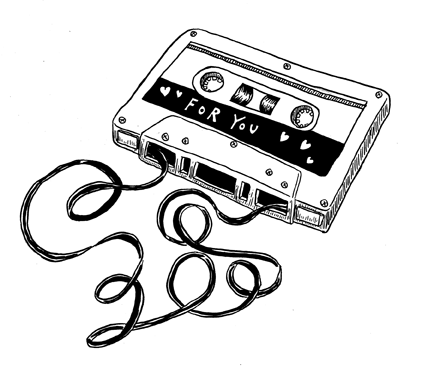
At the end of each month I make a mixtape and send it to a small group of friends. It’s a mix of new, old, and remixed music, with some fun rarities like unreleased b-sides or cover songs thrown in for good measure.
15 years ago I made mixtapes using a different methodology – cassettes. I taped songs from the radio or dubbed songs from other tapes or CDs. To my friends’ dismay I would cut in and out of songs, looping bits, chopping about to create my own customized mix. I decorated the CD case with felt-tip markers and distributed the batch from a tattered, blue plastic Gap bag that weekend or whenever I saw someone next (In other words they didn’t receive the mix right away. You can see where I’m headed with this).
Technology has made it innumerably easier to create and distribute a digital mixtape. However, these mixtapes are frowned upon by the powers-that-be because rights for each song need to be cleared prior to streaming them.
In a digital age of advanced marketing and cross-promotional tactics – why can’t a mixtape become a promotional vehicle, a flipped funnel so to speak – rather than totally shut out as a viable way of sharing music?
Hyperdistribution can work for an artist, not necessarily against.
15 years ago an optimal distribution method would be me sharing a song that I’m crazy about with, let’s say, 10 friends. Great case scenario, 5 of those 10 friends go out and buy the CD and even tell another friend or two about the band. Fast forward to now and this translates to quick dedications, sharing, tagging, and embedding with hopefully the eventual intent to buy the single or album.
I understand the popularity of widgets to share and track music. But I think there’s a need for something even more nimble; a universal technology that can allow a song to travel further by becoming directly associated with the content.
Perhaps something along the lines of an embed code could travel with each song, containing an accompanying click-thru link for users to purchase the content. The code could incorporate tracking so promos intentionally leaked to blogs could be followed and music could become legitimately spread by fans on a viral level. The code could be user or label assigned and registered in a database somewhere, like a Gracenote vox populi.
By tracking content but allowing it to travel freely everyone wins. The artist gets marketing feedback, promotion, potential sales and recognition, and I can safely put together a mixtape that rocks, all the while knowing that I’m not only telling my friends about this cool artist but also making it super-easy for them to buy the work or tell someone else about it.
This kind of technology could potentially legitimize sites like Muxtape, a playlist-building site that allows users to upload their playlists and share them with friends on a streaming-only basis.
Playlist building sites like Imeem are great because they clear rights from the labels up front – allowing users to stream, share, and embed content hassle-free. But what about us die-hard music fans who want to share the remixes, rarities, and b-sides – stuff that”s just not out yet?
DJ’s and music fans have been clamoring for decades to be the first to drop that unreleased promo or song that is bound to make everyone go nuts. The digital age hasn’t changed that. if I get my hands on a hot new song, I want to tell everyone I know about it. That’s the job of the DJ. It’s the job of a music fan. And that won’t change now or 15 years from now.
hello how are you?
how are you?
hello how are you?
how are you?
I love your mixes! And I totally agree. It’s hard now to share music in the same simple way we used to. In the sense of owning a song. We can listen to music online all the time, but there is nothing like having music recs from a friend and plug it into your workout mix.
I love your mixes! And I totally agree. It’s hard now to share music in the same simple way we used to. In the sense of owning a song. We can listen to music online all the time, but there is nothing like having music recs from a friend and plug it into your workout mix.
Great post Nicole!
I think the problem is that people just plain ole expect music to be free these days.
So, unless you make the song only play for a week once someone clicks on it – there is no incentive or urgency to buy it…
Great post Nicole!
I think the problem is that people just plain ole expect music to be free these days.
So, unless you make the song only play for a week once someone clicks on it – there is no incentive or urgency to buy it…
Comments are closed.